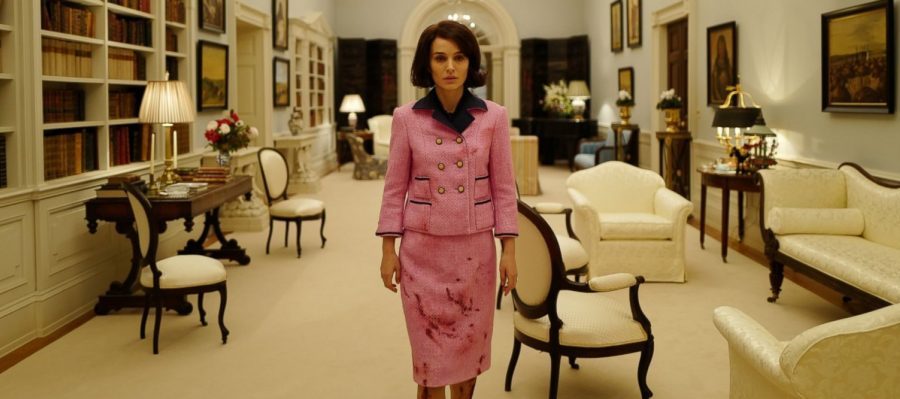Review: 'Jackie' Paints an Incomplete Portrait

Laura Cafasso ’18 / Emertainment Monthly Staff Writer
In the escort from the autopsy of deceased President John F. Kennedy (Caspar Phillipson), Jackie Kennedy (Natalie Portman) asks the driver and attending nurse, “Do you know James Garfield? What about William McKinley, Abraham Lincoln?” Besides the obvious nature of Lincoln’s death, neither of the two can identify the other assassinated presidents. Solemnly, the first lady sits in the company of Bobby Kennedy (Peter Sarsgaard), pondering the legacy of her murdered husband.
Jackie is the first John F. Kennedy biographical drama that puts JFK on the backburner, as compared to JFK, The Kennedys, Parkland, or Killing Kennedy. He is seen in only a handful of scenes, either in profile or in passing, rarely a full-on shot combined with conversation. One particular scene, during the end of Jackie’s White House tour for CBS in 1962, has President Kennedy accompany his wife with obviously dubbed dialogue from the real documentary. This is a risky choice by director Pablo Larraín, who could have established intimate portrayals of this infamously turbulent relationship.

Portman could win another Academy Award for her performance, which would mark the second time she’s teamed up with Jackie producer Darren Aronofsky, who directed Portman in Black Swan. The only hindrances could be the mismatched documentary style of filming and the onslaught of flashbacks to that White House tour Jackie gave in 1962. The prolonged, bucolic shots of the Kennedy Compound in Hyannis gave amateur filmmaking vibes rather than the grandiose majesty of America’s “royal” family.

Portman unequivocally delivers, but there is an underlying missing piece. At one point, Jackie believes that her husband will soon just be another oil painting on the White House walls. Well, this movie makes broad brush strokes without spending proper time honing in on the main inspiration: Jackie herself. There is no full backstory, just flashbacks of the shooting and funeral arrangements while she begrudgingly entertains an unnamed reporter (Billy Crudup) in the present. With a title like Jackie, you would think more of a life story would be explored, from her college education to her prestigious junior editorship at Vogue. She was a confident, enterprising young woman before she married into the Shakespearean tragedy that is the Kennedys.

Essentially, there will be great presidents in the future, but President John F. Kennedy was unique, and was never really down-to-earth; it was as if the whole presidency was a fairytale or fantasy. And now, Jackie must face the reality, that sometimes in life there are “no answers,” as her priest says.
Overall Grade: B
Watch The Trailer:
[embedyt] http://www.youtube.com/watch?v=g9pW3B8Ycc4[/embedyt]